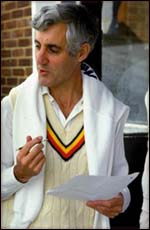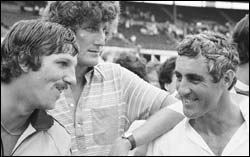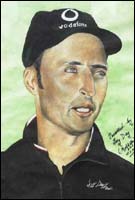The Rediff Interview / Mike Brearley
'I was very dedicated to the game tactically'
 Michael John Brearley affords a classic example of how even a mediocre cricketer can become an outstandingly successful captain. Though a very fine batsman at first-class level, Brearley could not enhance his reputation with the willow in international cricket. But few could match his skills, and the resultant track record, as a leader of men.
Michael John Brearley affords a classic example of how even a mediocre cricketer can become an outstandingly successful captain. Though a very fine batsman at first-class level, Brearley could not enhance his reputation with the willow in international cricket. But few could match his skills, and the resultant track record, as a leader of men.
Yes, if Brearley is reverently remembered today, it is only because of his astute captaincy, which made an otherwise not-so-strong English team a force to reckon with in international cricket in the late 1970s and early 1980s.
The former Cambridge and Middlesex batsman, whose razor-sharp brain and remarkable ability to get the best out of his players, especially Ian Botham, led England to 10 wins and 5 draws before tasting defeat. He had earned the respect of his players despite failing to justify his place in the England team as a specialist opener. Brearley, who gained a first in Classics and an upper second in Moral Sciences while at Cambridge and finished top in the 1964 Civil Service examination, had the rare gift of reading the minds of his players. When the former Australian fast bowler Rodney Hogg said that Brearley got a "degree in People", he was only echoing the feelings of many impressed by the Englishman's captaincy.
Considering his scholarship and brilliant mental gifts, any career was open for Brearley when he retired as a cricketer after helping England regain the Ashes in a sensational manner in 1981, with Botham working those miracles of his in as many as three of the six Tests. But he chose to work as a psychotherapist, freelance writer and lecturer side by side.
A very sweet talker, Brearley can enlighten his listeners with his lucid style and forthright views as Haresh Pandya discovered during the course of the following interview with him the other day. Excerpts:
There cannot possibly be a better person to speak authoritatively on the art of captaincy than your intelligent self. What, in your views, makes a good captain?
There are various factors that make a good captain. The most of important of all is your ability to get the best out of your players. And to do this you must know what makes them `tick'. It is also very essential to have a good cricketing brain in order to think and plan different tactics at different times on and off the field. The tactics can vary from short-term to long-term.
You should have a clear idea as to exactly how you want to achieve your objective, whatever it may be. In other words, your approach should match your goal as a captain at any given moment. You should be willing to experiment. You should be prepared to be very orthodox as well as ruthless at times. It is not easy to sum this up. But again and again you have got to get the best out of your players. In a way that is the key to your success. You should have some sort of rapport with your players. You might not get on very well with them, you might not like each other that much, but you must be able to communicate properly, positively and person to person.
How far do you agree with the truism that the captain has to perform consistently well as a player so that he can ask his players to do so too? Does he always have to set an example himself?
 Well, it is much easier if you perform. But even if you can't sometimes, you should be able to encourage and inspire your players to do well. Of course, it depends on what sort of rapport you enjoy with different players, how much respect you have, how much you add to the value of the team by your captaincy. It is much more difficult to keep your own self-respect if you are not performing fairly well.
Well, it is much easier if you perform. But even if you can't sometimes, you should be able to encourage and inspire your players to do well. Of course, it depends on what sort of rapport you enjoy with different players, how much respect you have, how much you add to the value of the team by your captaincy. It is much more difficult to keep your own self-respect if you are not performing fairly well.
Still, it is not so necessary; it is not always the case. But then I was very lucky in this regard simply because I had Ian Botham in my team. He was at the height of his cricketing prowess then and his presence in the side made my task very easy often enough.
If a captain is an extraordinary player also, is it fair on his part to expect his fellow players to perform like him always? For instance, if Sachin Tendulkar is the captain and he expects others to contribute the way he does...
In that case he will be foolish to expect the same from others because no one else in the world can bat like him. No, you cannot, and should not, expect your players to be like you, howsoever great you are in your specialized role on the field. No two players can be similar. Nor can X contribute the same way to the team as does Y, for instance. After all, cricket is a team sport and ultimately what matters is the successful collective effort. But every player has to try his hardest for his team, his captain.
How much emphasis do you lay on the captain being educated when it comes to assessing his chances of success?
Rather than being highly educated it helps to be emotionally mature; to be emotionally shrewd. It helps to have your heart in the overall game as well in your own play. But education is not much important. If it helps you achieve your goals, it is fine. But it is certainly not essential for a captain. There have been instances of bad captains being highly educated; and very good captains who have not been that much educated. I thought Keith Fletcher was a very good captain. He went to a small village school in a countryside and left it at the age of 15. I knew him best as a captain of Essex in county cricket. In fact, I thought he was excellent.
But he did not do well when he led England...
He did not get much chances, you know. He came out here [India] in 1981-82 for a six-Test series. They lost the first Test in Mumbai and the rest were drawn. He had some very bad decisions. I remember him smashing the stumps in the Bangalore Test. He was treated dreadfully by the selectors. He should not have been kicked out as a captain. He should have been given a chance.
How much 'say' a captain should have when it comes to team selection? What should be his role in such matters?
I think he should have a bigger role because he is the man who has to back the bowlers. He should feel confident about the bowlers he is given. Only a captain knows precisely what he wants so he should definitely be consulted before the selection of the team. He should have a fair degree of 'say' in such matters. I gathered Sourav Ganguly was not even consulted before the Mohali Test. I thought it was ridiculous. How can you expect him to do well when he does not even know the bowlers at his command, especially when he does not probably have a good opinion of them?
There is a school of thought that believes bowlers generally do not make good captains. Do you support this belief?
Yes. I think it is particularly very hard for fast bowlers. They need a lot of adrenalin, they have to be very aggressive, they have to run a lot and they have to be very physically involved in the game. I do not think it is easy to combine that with the more reflective side of being a captain. But I think allrounders can be very good captains. Richie Benaud and Ray Illingworth, for instance, were very good captains. Shaun Pollock, too. Oh, he is a fast bowler! But I have not seen much of him, really.
Can't the same be said about wicketkeepers as well?
Yes. It is also very hard for them because they have to constantly communicate with bowlers. I think it is very, very hard for a wicketkeeper to be a captain, let alone a good captain. I do not know if there has ever been a really good example of a wicketkeeper being a good captain at the Test match level.
How was your own approach when you captained England?
My captaincy was intuitive at that time. I have trained myself as a psychoanalyst since then. But at that time it was mainly intuitive and personal. Maybe I was good at reading the minds of some of my players. It was easier with Botham and I think I handled him quite well. I was his first Test captain. He was less headstrong. Though we were very different, we got on very well.
What was the secret of your sweeping success when at the helm of the England team?
Luck. Botham, too, of course. I was very dedicated to the game tactically; I was very much interested in tactics. I was very willing to experiment and try different things. I do not know how or why, but psychologically I got on well with several players. I got on well in the sense that I probably knew how to make my players perform.
Would you mind saying something about the Mike Denness episode?
Frankly, I did not see that Test match in South Africa. I did not see a single ball bowled or fielded. So I have no idea. I could not really say anything about the decisions taken by Mike Denness. They may well have been harsh decisions but I do not know. Of course, I can say something from what I saw at one particular juncture in England's first innings in the Ahmedabad Test. The Indian fielders, thinking that Craig White was caught, went too far, in my view. Their body language was too prolonged, too obvious. Maybe, it was a bad decision on the part of the umpire to give the batsman the benefit of doubt.
As the fielding side you feel disappointed, Okay, but you have to just get on with the game. But such behaviour stirs everyone in the crowd up. It is designed to make the umpires appear bad. They need to be a bit more self-controlled. If my players had behaved that way, I would certainly have tried to stop them as a captain. I gather worse behaviour was seen from the Indians in South Africa.
All I can say is we are all humans, we all make mistakes, we get so excited, we get angry, we get frustarated. When you are on a foreign tour, you tend to feel that things are going against you; and sometimes they are. Yet, you have to believe that the umpires are presumably doing their best and the match referee also. But it is not a good reason to go against the entire ICC, if you get me.
How do you find Sourav Ganguly's captaincy?
I have not really been close enough to know him or his captaincy. I just have not seen him day in, day out. So I could not possibly give you an opinion.
 But you would like to say something about Nasser Hussain the captain, wouldn't you?
But you would like to say something about Nasser Hussain the captain, wouldn't you?
I think he is good. I like his captaincy. I have seen more of him than anyone else as a captain. He and Steve Waugh appear to be very good captains. But I like Nasser Hussain a bit more. He is willing to try things. He obviously has gained the respect of his team. He treats people differently and according to their character. I thought he was very good with someone like Andy Caddick. He was really nice to him. He humoured him, helped him and also tolerated his idiosyncrasies. Whereas with someone else he might be tougher. I like the way Nasser Hussain does his job.
You mentioned Steve Waugh. What impresses you about him?
Steve Waugh is a terrific player in addition to being a very good captain. But do not forget he has got a strong team, which makes his task presumably a bit easier. But I do not know him close enough. You have to know him closely to pass a judgement on him. But I certainly rate him very high as a captain.
The match referees seem to be out to remove aggression from the game completely. Cricket is already short of colourful characters and such a hardline approach on the part of the ICC officials may make it absolutely bereft of such players. Having played with someone like Botham, don't you think we should make sure the game does not have to suffer for want of characters?
Aren't Sachin Tendulkar and Harbhajan Singh big enough characters in their own right? I am actually slightly questioned about the notion of character. I think it is good to have characters; but is better to have players who are actually reliable. Someone like Rahul Dravid, for example. Surely, you cannot say he is a great character. But he is a tremendous player with plenty of skills, stamina and concentration. He has got all those beautiful shots. You could say the same in future about Marcus Trescothick. He looks a very good player to me. I am not too worried about characters. I am worried about people being good at it and involved in it.
Interviews
Mail Cricket Editor